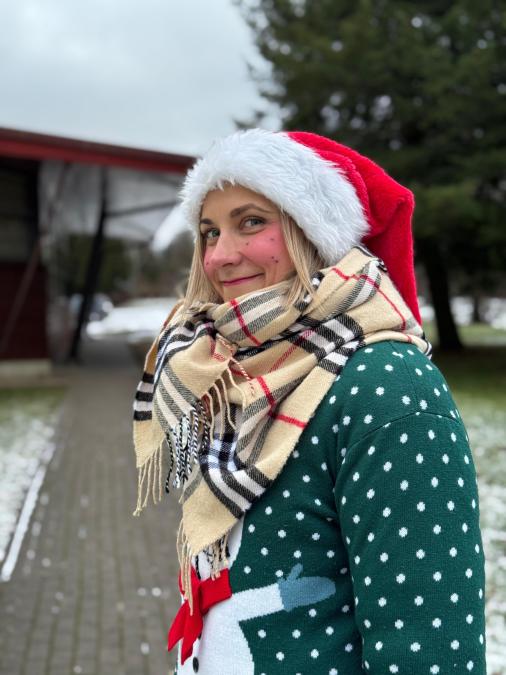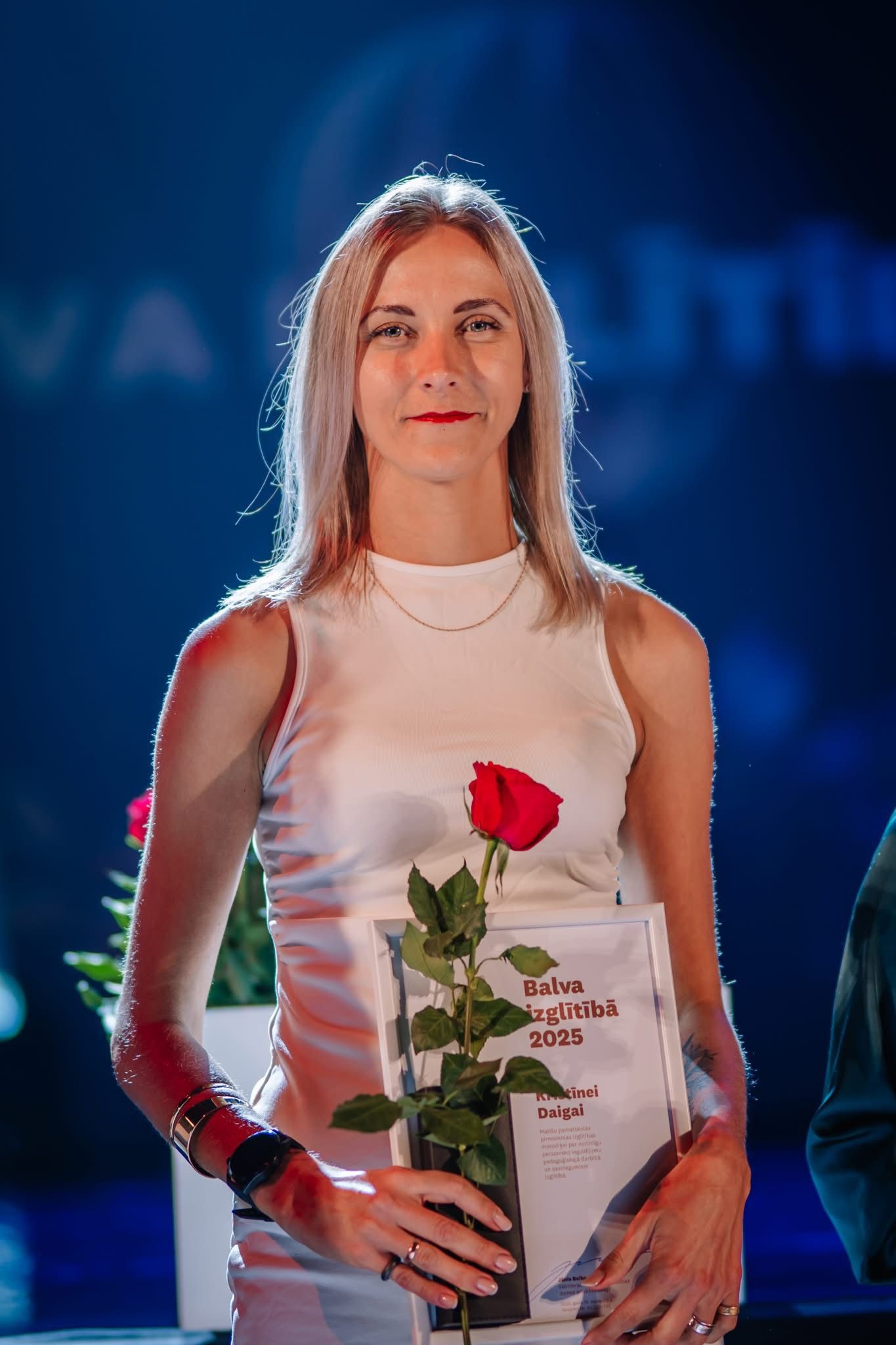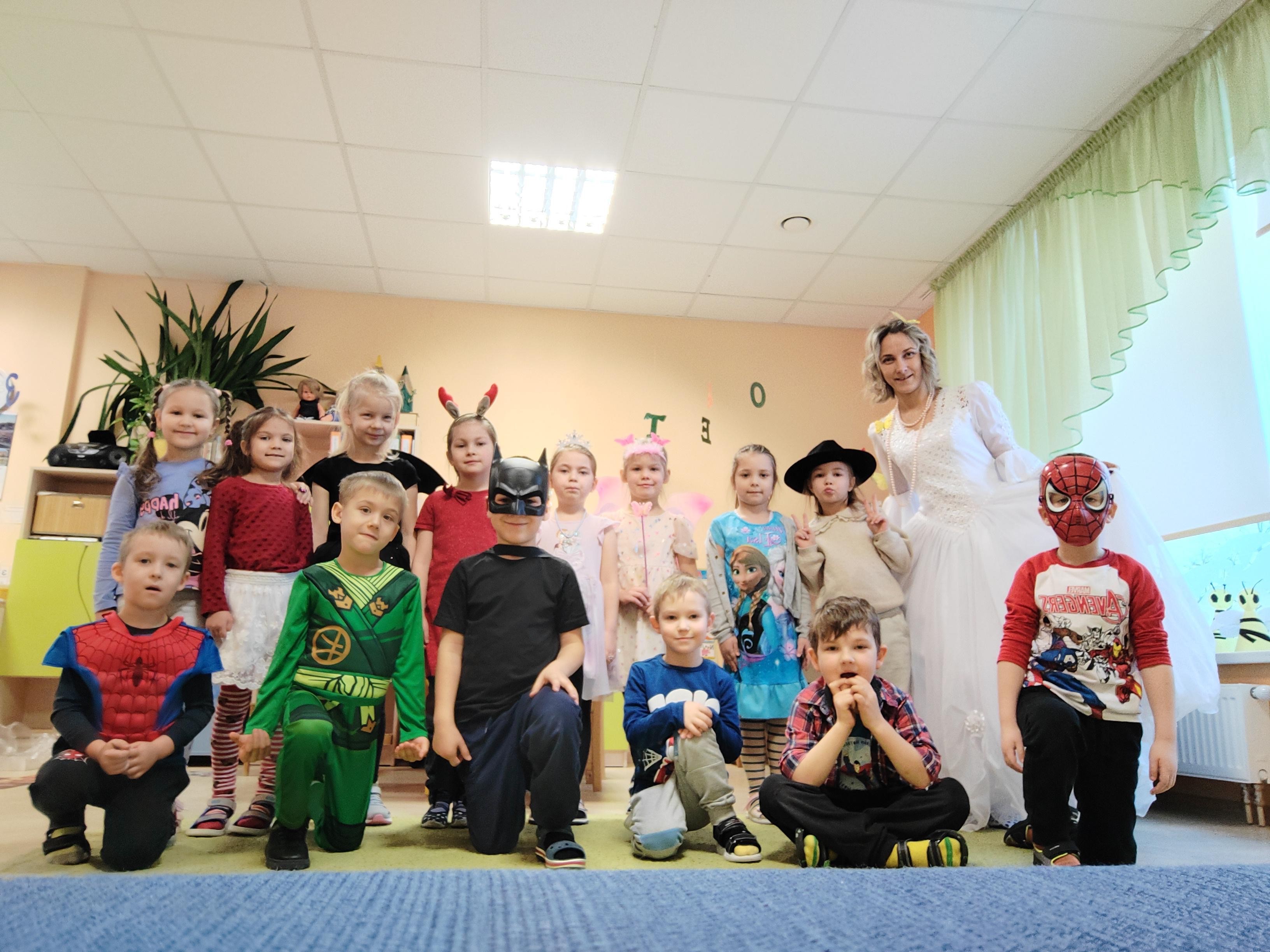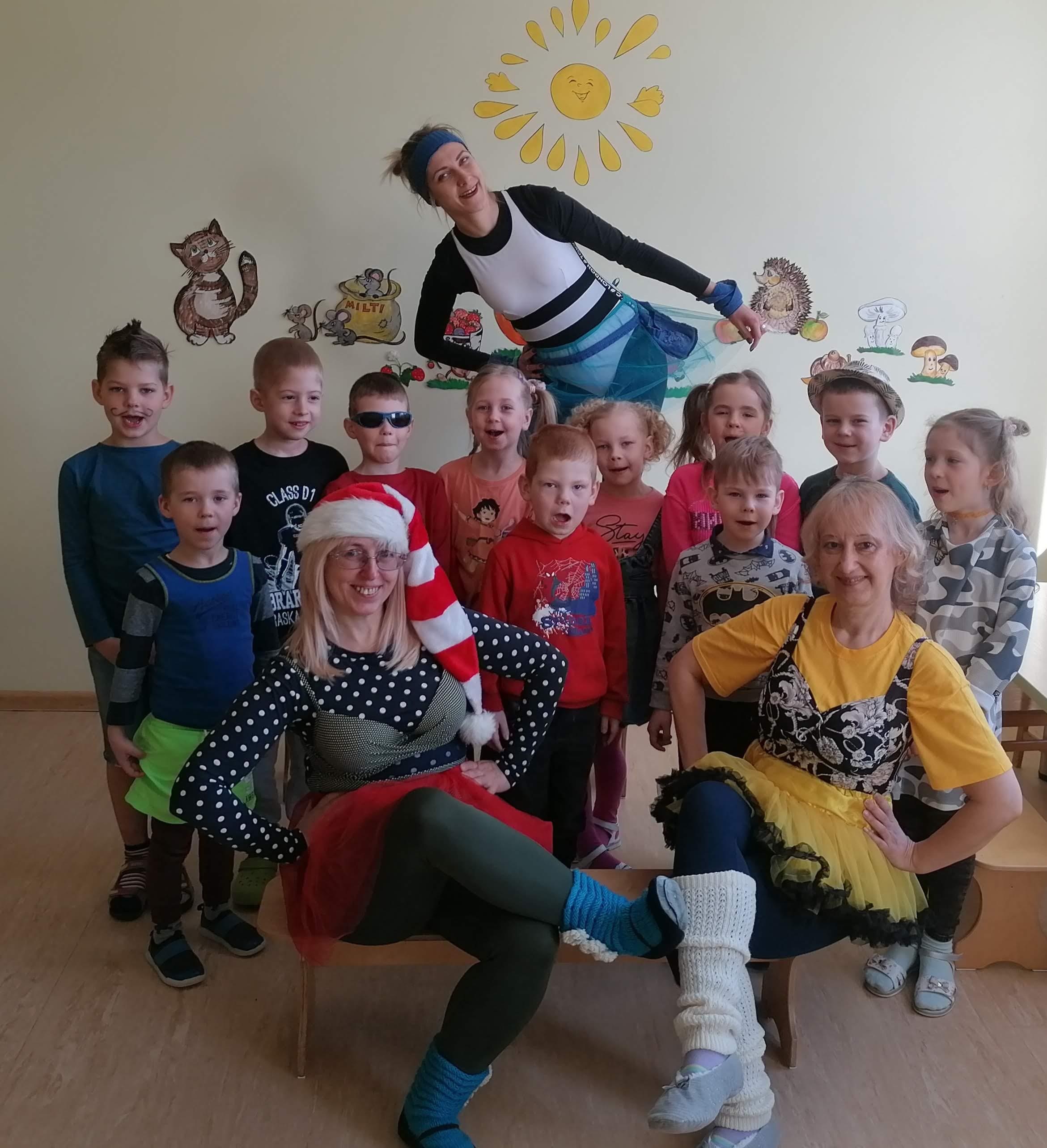"The person who steers this balloon is not afraid of heights, challenges or the unknown. She is a pilot who has created her own flight route. Not because the path was already clear, but because she knew how to imagine it." This is what the regional government has said about Kristīne Daiga, appreciating her work with the Annual Award in Education 2025 for significant personal contribution to pedagogical activity and achievements in education. Kristīne Daiga is a preschool methodologist at Matīši Primary School.
The preschool educational groups at Matīši Primary School are a place that creates a safe and inspiring environment. With three groups and a small but close-knit team of educators, the institution is proud of innovative initiatives, such as its "Circular Economics Library". In this interview, we talk to Kristīne Daiga, who shares her experience - from working as a teacher to working as a methodologist. Kristīne talks about creating creative materials and promoting collaboration with colleagues and parents, as well as highlighting things that should be improved when implementing inclusive education in the institution.
What has been your professional journey from teacher to methodologist at Matīši Preschool, and what challenges and decisions shaped it?
“I’ve been working in preschool for eight years now. I started as a teacher for the youngest group and as a sports teacher. I was studying at the same time, and it was a huge challenge and responsibility to work with the little ones and the entire preschool as a sports teacher. Back then, our institution had two additional groups—later a third was added, but by that time, I had moved to working with the older age group. That was a challenge too, because a colleague was retiring, and my manager at the time put me on the spot, asking me to choose whether to continue in my usual routine or start working with the older group alongside a very experienced colleague. I decided to take the risk, though I had doubts about whether I could work well with the colleague—I tend to be very critical of myself and my work—but it worked out. During Covid-19, I also worked as a music teacher. Essentially, I love challenges and new opportunities. Then, two years ago, the methodologist at the time, who was about to go on maternity leave, approached me and asked if I wanted to take on the methodologist role. Of course, a meeting was held where every colleague could share their thoughts and wishes about the position. The result—100% in my favor. I was scared, though, because methodological work has its own specifics, and a methodologist often takes on significant responsibility for the institution, collaboration at various levels, and with different people. My colleagues say, ‘You’re doing great!’ Now I can say—yes, it was a very good decision because I love what I do, and I’ve been doing it for two years now. That’s been my journey to this role.”
What do you enjoy most about being the methodologist at the institution?
“As I mentioned in response to the previous question, I’ve been in this role for two years, and what I enjoy most is the ability to collaborate. It’s great to live in a place where everyone knows you, and you know everyone. It makes it much easier to discuss and arrange things. I really enjoy creating materials that teachers need for their daily work, as well as finding and developing various visual aids, informational resources, and links to make group work easier. Over these two years, I’ve also created folders with worksheets for different subjects, which make it easier for teachers to access materials. I like making teachers’ work easier because I know what it’s like when you need something, and it’s not there. So now I think about what’s available, and if it’s not, I make sure it will be. I also love creating an environment where everyone feels safe and comfortable because that’s important for everyone. It immediately improves work capacity and quality.”
What personal qualities do you think are most important for someone in your position?
“Working in this role, I’ve realized that good speaking, communication, and self-control skills are essential. I can explain that through communication, you can discuss and achieve a lot, but you need to know how to speak correctly and calmly—you need to control your voice. This leads to wonderful collaborations.” Yes, self-control is crucial because often your personal opinion wants to scream and say, ‘No, that’s not right,’ but you have to pull yourself together and find a compromise to maintain a safe environment, trust, and peace, which are very important in preschool.”
Can you share the challenges you face daily as a methodologist and how you overcome them?
“The biggest challenges come from finding balance when talking with teachers and parents, especially in discussions about a child’s development and behavioral issues. Of course, when it comes to routine work, you also need to be a bit of a psychologist because when a child misbehaves too much in a group or during sports or music classes, they’re usually brought to me. In other words, if they act ‘naughty’ outside group rules or hurt someone, the teachers bring the child to me, and we talk, draw, and work toward finding a solution or the root of the issue. It’s not easy because, essentially, as a methodologist, I need to know the names, ages, and abilities of all the children in the institution’s groups to have a meaningful conversation. The methodological office isn’t like a school principal’s office where you write an explanation if you’ve done something wrong. Here, we talk and find a solution—usually with a positive outcome.”
What advice would you give to someone who wants to become a preschool methodologist or work in a preschool in general?
“Preschool is like an anthill where you need to understand that it will never be boring or quiet. Well, okay, it’s quiet when the kids are napping, but then there are other tasks. It’s a role full of challenges—someone taking it on needs good communication skills and the ability to see the bigger picture. For someone wanting to become a methodologist, they need to understand that methodological work isn’t just about preparing or finding materials but also a big responsibility for the entire institution and all its ‘ants.’ A computer, printer, laminator, and a creative mind are daily allies. You definitely need good skills with computers and new technologies because, in my case, I’m also the tech person and the event organizer. I tell my colleagues I’m a ‘multifunctional ninja.’ I forgot to mention that it’s important to know yourself and whether you can organize your day in a way that allows you to change it at any moment if needed.”
How many teachers, teacher assistants, and children are in your institution?
“In total, Matīši Elementary School has many teachers, but in the preschool, we have eight teachers, including music and sports teachers. We have a wonderful speech therapist and a kitchen manager—as we call her. There are 60 children in total. We have four teacher assistants.”
Is there anything unique about your institution that you’d like to share with ELIIS blog readers?
“I can mention our wonderful institution’s library story. Ant Urda called it a circular economy library. The essence and reason for its creation—two years ago, by pure coincidence, I started cleaning out my home library and decided that the books my children no longer read could be donated to the preschool. I realized there were a lot of them and thought we could create a free library where parents and children could borrow a book, read it, and bring it back. To prevent books from ‘growing legs,’ we added a sign-out sheet. And here’s the story of that coincidence—the institution’s annual methodological theme aligned with the library’s creation—reading literacy. It was amazing that my mind somehow sensed this would work and be valuable. For two years now, parents and children have been improving the library, and we, the staff, also add to and update the book collection. The kids love it. How do I know? My office is across from it, and I hear their joy and great interest in the books. Another thing I think is unique about our institution is the parents! They’re amazing and very open to collaboration. Together, we’ve improved the institution’s environment, and event attendance is great. What more could we want—happy kids and joyful parents. I really like it when parents have a concern or something unclear, they talk. So, here’s the answer about communication again—as I mentioned before, it’s great to be where everyone knows you, and you know everyone.”
How has the role of a preschool teacher changed in recent years?
“In recent years, the role of a preschool teacher has changed significantly, reflecting broader changes in society, educational approaches, and understanding of child development. Sometimes, I feel like saying something has ‘broken’ regarding the overall perception of the profession and child-rearing models. Preschool teachers increasingly adapt teaching approaches to each child’s needs, which requires a lot of time and effort. Another important aspect is that digital tools are used more frequently in both teaching and communication with parents. One hand holds a book, the other a phone or computer. Teachers are no longer just knowledge providers—they’ve become consultants, second moms, lightning rods, ‘doers who don’t complain.’ Broader professional competencies are expected in almost everything! There’s a lot of unnecessary paperwork, in my opinion. But there’s a gap—teachers have to deal with increasing demands, children’s diverse needs, interactions with various family situations, often insufficient societal recognition, and low pay. The work has become a bit stressful because there’s growing permissiveness and lack of control among children, but we teachers try our best. It’s always important to remember that we have families, children, free time, and hobbies too. We’re just like everyone else.”
What innovative teaching methods or tools have you introduced in your institution, and what results have been observed?
“I haven’t made major innovations—as I mentioned, I’ve simplified teachers’ work in many documentation and record-keeping tasks by using Google Docs, introduced an annual plan that’s shared across the institution and visible in ELIIS. I also put many important documents in the ELIIS system. We use ELIIS a lot because it’s convenient and easy to use. I can also mention the free library I talked about earlier. The results are good because teachers don’t have to run around the institution to find or see important information, and there’s much less paperwork. We also participate in a local initiative—ZAAO.” This year we are participating in the ESF + STEM project. We visit local nursing homes, promoting civic participation. We choose high-quality performances and concerts as a supplement to learning cultural skills. We visit and get to know local manufacturers and companies. On educational excursions we go to see our local pearls - local cultural monuments and natural objects. We cooperate with neighboring preschool educational institutions. Cooperation with the State Police has also been established to raise awareness of safety and the serious consequences of mobbing.
What skills do you think are most important for preschool teachers today, and how do you, as a leader, help your staff develop them?
“Very important skills for today’s teachers are emotional intelligence—the ability to recognize, understand, and regulate both their own and children’s emotions. Empathy, patience, and tolerance. Collaboration and communication skills, or effective communication with parents, colleagues, and support staff. The ability to build trust-based relationships in various aspects. Applying individualized approaches, or the ability to adapt teaching methods to a child’s abilities, interests, and needs. Understanding and implementing inclusive pedagogy in practice. Of course, digital skills are also necessary. How can a leader help staff develop these skills? By organizing seminars, lectures, and experience-sharing days. Supporting participation in external courses or conferences. Creating an environment where teachers feel heard and valued. Encouraging open discussions about challenges and solutions. Assigning experienced colleagues as mentors for new teachers. Promoting a collaborative culture—planning and analyzing situations together. Offering practical training courses on specific tools.”
How do you support teachers who may be less confident in using digital tools or modern teaching methods?
“I’d like to start with my stance on digital tools and everything new that I know. When I was little, my mom taught me to walk, eat, and be. Now I can help my mom (or colleague) learn what I know. It’s a kind of feedback loop, respect, and understanding, considering age differences and abilities with digital tools. It’s not surprising when someone asks for help—it’s great, because as my dad says, ‘What’s that gap under your nose for, if not to talk when you don’t know or understand something?’ That’s how it is, and that’s the story of communication. With this mindset, I move forward and help without objections or excuses. I often talk and help with everything I know, and if I don’t know, I find out. I encourage others not to be afraid and always use myself as an example—because I wasn’t afraid, I did it, and it worked out.”
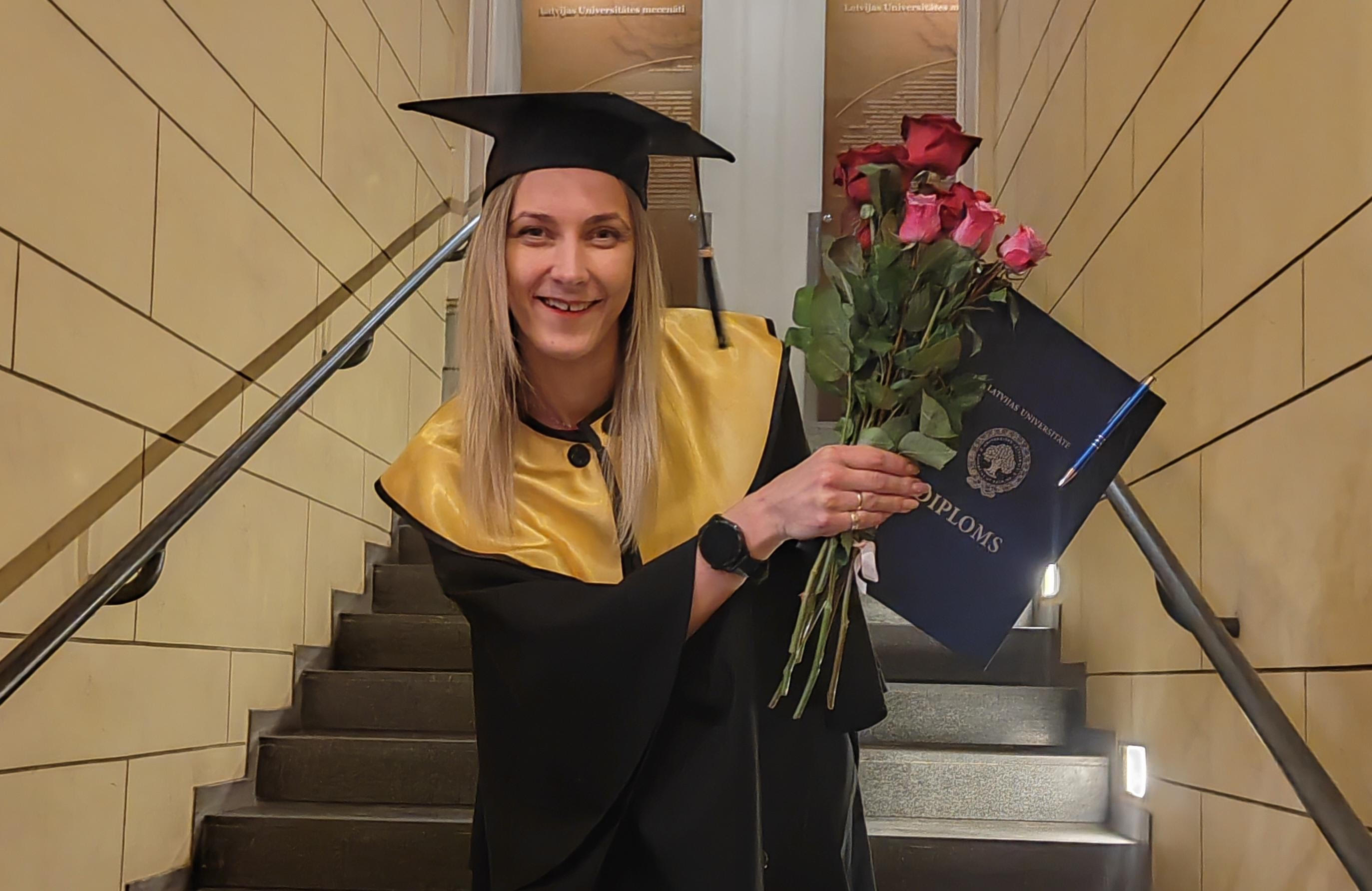
How do you involve parents in their child’s early education, and which strategies have proven most effective?
“Parent involvement isn’t just about sharing information—it’s a partnership. You need to create an environment where parents feel heard and involved, where they understand their child’s developmental goals and progress and are invited to participate. The strategies are simple—daily updates or photos on a digital platform like ELIIS, individual conversations, and regular developmental discussions. Information boards with current updates about the institution’s work or plans, along with small daily tips to collaborate more effectively with parents and children to reach a common goal. Parent involvement is crucial. Thematic creative workshops (with children, like creating a Latvian heritage exhibition). Joint celebrations or Ewents where children perform, and parents help with preparations. Conducting parent surveys and participating in a parent council. We also try to organize parent meetings where we not only inform but also educate parents on various child development topics. As I said, our parents are great, so I believe this is important—building positive relationships and trust, which means acknowledging parents for their involvement and maintaining a respectful attitude, even if parents are very busy or critically inclined.”
What problems do you most frequently encounter in communication with parents, and how do you resolve them?
“The problems often aren’t as big as they initially seem. Frequently, it’s about the wrong tone or a misunderstanding in how information is conveyed. Resolving misunderstandings—human errors that each of us perceives or handles differently. And here’s the communication story again. There’s always the option to ask or clarify with the methodologist about something unclear, but sometimes parents choose to address these issues through anger or resentment. There are cases where they first call the municipal authorities, and only afterward do they realize it could have been resolved humanely through communication. But everyone has their own way of resolving conflicts or uncertainties. Most often, we discuss the situation again, over a cup of tea, and reach a positive resolution because it turns out it was a human misunderstanding. If the situation doesn’t resolve calmly, everything is documented, and it’s addressed with a solid argument base. But mostly, everyone wants peace.”
What systems or platforms do you use to manage preschool operations, and how have they improved your workflow?
“The main systems or platforms are Google (much of what it offers), Wordwall, LSM Bērnistaba. We also use various platforms in our work profiles, and of course, ELIIS. Last year, we also used Soma.lv. The internet and digital tools simplify restructuring information in one place, which makes work easier because you don’t have to dig through piles of paper. Of course, paper is still needed, but much less so. That’s just how it is—what era we’re in, those are the tools we use.”
What do you think the future of early childhood education looks like, and is your preschool ready for it?
“When talking about inclusion and individualized approaches, it looks great on paper, but in reality, it’s not that simple. I’m speaking generally because if it’s about one child in a group, that’s one thing, but when it’s several children with serious developmental issues, rural preschools lack assistants to work with these kids. Imagine a children’s party with 24 kids, five of whom are on individual programs. The group has two teachers and one assistant. Each child needs attention, help, and much more focus on those with individual plans and different teaching approaches. It’s not easy. I’m not against it, but let’s remember teachers are human too. Are we ready? As ready as we can be, we try our best to create a safe and inclusive environment for each child’s abilities and developmental level. Regarding digital devices in preschool, honestly, I don’t know. I think kids already spend a lot of their free time at home on them, so in our institution, we strictly monitor screen time (5-20 minutes). On emotional and social intelligence—we work on that a lot. We talk and discuss—it’s important. Regarding a greener environment—yes, I’m all for it, and our institution sorts, sows, plants, cares for, and harvests—all with the children. But I really wish there wasn’t such a strong emphasis on achievable outcomes but rather on the child. I always want to ask—where does childhood go for these kids? The green meadows, games, and simple joy… Of course, this is my subjective opinion. And as I’ve mentioned before—yes, collaboration and communication with parents are key so that parents are present, not just observers. Summing it all up, I believe our institution is ready, and if we’re not somewhere, we’ll prepare if needed because where else would we go—the future of early childhood education is in our and parents’ hands. I haven’t shared my thoughts this much in a long time. Thank you for that!”

